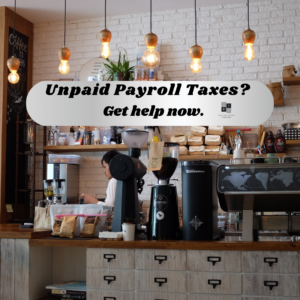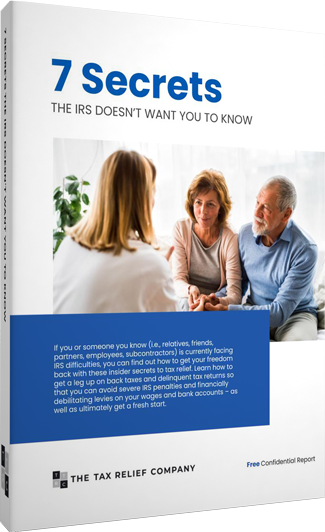Owe Payroll Taxes? Here’s What to Do.
Are you a small business owner that owes payroll taxes? Here’s what to do.
The IRS takes unpaid payroll taxes seriously. These are some of the worst kinds of back taxes you can owe. If you’re a small business owner with payroll tax problems, read on to learn what you can do to avoid the IRS crippling your business or, worse, shutting your business down completely.
And why would they do this? When you withhold taxes from employees’ checks, it is not yours. Not paying taxes is considered stealing.
 Why Small Business Owners Get Into Payroll Tax Trouble In The First Place
Why Small Business Owners Get Into Payroll Tax Trouble In The First Place
It’s hard being a small business owner today, trying to pay your employees their paychecks every week and pay the IRS all those payroll taxes.
A lot of times, when money is short, you pay the employees first. You need to be able to take care of them even if it means not paying yourself. If nothing else, the process of having to find new employees is a pain – don’t make them quit on you!
It can seem easy to “just pay it next pay period” and give yourself a little cash flow cushion, but skipping paying your employee’s payroll tax deposits is never a good idea.
What happens too often is one pay period turns into the 2nd, the 3rd, and then the 4th. Eventually, you’re so deep in payroll tax debt that the only thing you want to do is completely ignore your problem.
The IRS doesn’t care if you can’t pay your employees. They don’t care if they put your employees out on the street. It just doesn’t matter if you can’t collect your receivables. They don’t care if one of your largest and best customers just went “belly-up”. You have money that belongs to them, and they will do whatever they have to. They’ll put you out of business to collect it. They don’t care who you are or what business you are in.
Penalties are The Kiss Of Death When It Comes to Back Payroll Taxes
Penalties for failing to file and pay your payroll taxes are the “kiss of death” for any small business owner. They tack on penalties totaling 33% in just the first 16 days! And it doesn’t stop there. The IRS adds interest on top of the penalties too. It is not uncommon that a payroll tax liability doubles in short order. And if you don’t pay them or work something out, they will shut you down. Why would a Revenue Officer want to work out an arrangement with you when shutting your business down is much less work?
The IRS Will Collect, or They Will Shut You Down
It’s as simple as that. The IRS is the most brutal collection agency on the planet. They have more authority than the President of the United States. Therefore, they have all the ways and means to do whatever it takes to collect what’s owed to them. Even though you certainly didn’t expect to be short in funds, you weren’t avoiding payroll taxes because you didn’t want to. The money simply wasn’t there. It’s not your fault. One week you’re short of cash. It was a slow week, a customer’s check bounced, or there was some other reason preventing you from paying the IRS. The following week comes and goes, and you realize you still don’t have enough money to make that payroll tax deposit. And then the entire situation starts “snow-balling” into an avalanche.
Should You Call The IRS To Get Your Payroll Issue Fixed?
If you were to call the IRS and were able to get through after waiting on “hold” for an hour or more and try to explain your situation—you might as well have a conversation with the wall—because they don’t care. The IRS representative that you’re talking to probably makes less than $20 an hour and isn’t adequately equipped to handle too many issues. These representatives have probably never made a payroll in their life. Do you think they know what it’s like running a small business? Do you really think they will have any sympathy for you?
Not only is the answer “NO,” but they can also dictate the fate of your case. They will try to get all your personal and financial information while you’re on the phone. They want to know where you bank; they’ll want to know all about your customers who owe you money; they’ll want to know about the value of all your assets, like your home, cars, motorcycles, etc. Why? Because now they have all the information they need to levy your bank accounts, take your receivables and seize your property.
Plus, customer service is a misnomer. You are not their customer; the government is!
Now that you know you shouldn’t be talking to the IRS because they are not going to help you, you might be wondering what you should do. Where should you turn for help? The smartest thing you can do to protect your business and family is to have someone represent you—someone who deals with the IRS for a living. You need to get help from an experienced tax expert. An Enrolled Agent deals with the IRS every day, helping small business owners keep their businesses and settle IRS payroll tax problems.
Find a Resolution
Jeffrey Schneider EA, CTRS, ACT-E steps into your shoes and protects you from the IRS’s abusive tactics. He takes over all communications from the IRS on your behalf. Once they realize you have someone on your side protecting you, who knows their tricks as well as they do, they have to step back and follow the law. Not only can he protect you from the IRS harassing you and showing up at your front door, but he can also get those penalties reduced and, in some cases, completely removed!
If you can’t pay on time, don’t ignore the letters or correspondence you get from the IRS. Reach out to us, and we’ll schedule a no-obligation confidential consultation to explain your options to permanently resolve your tax problem. You can avoid a federal tax lien by simply filing and paying all your taxes in full and on time.


